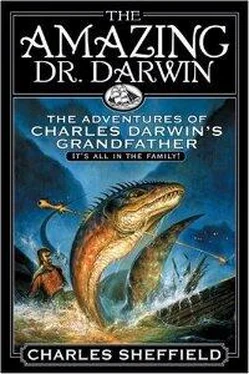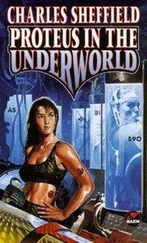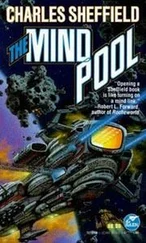Pole laid down the final sheet. Across from him his companion did not seem to have moved, but almost half the pie had vanished and the vegetable tureens were much diminished.
Darwin sniffed and shook his bewigged head. “A mystery, sure enough. And a clear cry for help. But I heard nothing that could not have been read aloud in the presence of Dr. Withering.”
“True enough. But there is more. And it is more personal to the family.” Jacob Pole tapped the letter. “Milly didn’t spell it out to me, because she knew I know all about it, but she has other worries on Kathleen’s behalf. You see, two years ago Kathleen was engaged to another Dunwell. That was Richard, Brandon’s elder brother. But he stabbed a man to the heart, was tried for it, and sentenced to death. The day before he was due to be executed he broke out of his cell and escaped along the cliffs east of Dunwell Cove. When he was cornered he jumped into the sea rather than be recaptured. Three days later his drowned body was found at low tide, trapped in the rocks and the tidal ponds. Kathleen was of course heartbroken by the murder, the trial, the verdict, and then the suicide. So now, when there’s talk of a phantom, and people say it’s the ghost of dead Richard… you can see how poor Milly’s thoughts are running.”
“She wonders about a ghost, which I can believe in no more than I am persuaded of the existence of a phantom who performs so mundane a function as the robbing of coaches.”
“Perhaps.” Pole was at last helping himself to food, while conscientiously avoiding Darwin’s eye. “But if it’s no ghost, then we need another explanation.”
“Which in the circumstances is quite impossible to provide.” Darwin reached far along the table, to slide within easy reach a round of soft cheese and a bowl of dried plums and candied peel. “Jacob, I love a good mystery as much as the next man, and perhaps a deal more. But if you have heard me say it once, you have heard me say it a hundred times: In medical analysis, there is no substitute for personal presence. For if medication and surgery form the lever of medicine, examination provides the fulcrum of diagnosis which allows them to act. One must observe at first hand: the jaundiced eye-ball, the purple or livid lips, the sweet or necrotic breath. One must examine the stools and the urine, and palpate the cool or fevered skin. Without that direct evidence, a doctor has nothing but hearsay. And in many ways, the curious events involving your cousin and her daughter are little different. So what, to continue the medical analogy, are the facies of the situation? I can list a dozen facts which may be important, and concerning which we know nothing. Without facts to sink them, a thousand ideas can be safely launched. Yet you would propose that we sit here in Lichfield, and conjure an order of events in west Cornwall? I say, that cannot be done with any shred of plausibility.”
Pole nodded gloomily. “I suppose you’re right.” He said nothing more, but went on quietly eating. After a few seconds Darwin reached across to pick up the letter and began reading it over.
“When is the wedding?” His words were hardly intelligible through a mouthful of Caerphilly cheese and plums.
“February 12th—ten days from now.”
“Hmph. Do you know the bridegroom?”
“Neither him, nor his dead elder brother. In truth, the whole Dunwell family are strangers to me.”
“And your niece, Kathleen?”
“I was present at her birth. She deserves the best husband in the world.”
“And finally, your cousin Milly. Would you describe her as an imaginative woman, one with an active fancy?”
“Quite the opposite. She’s direct and straightforward, with a bottom of good sense.”
“Hmph.” The silence this time went on for much longer, until at last Darwin stood up and walked over to the window. He peered out, looking up at the sky. “Ten days, eh? And it is sixteen days to the full moon.”
“That’s right.” Pole was suddenly smiling. “Ample time. It would be four days each way, six at very worst. We would be there and back, and you’d not miss a single meeting of your precious Lunar Society.”
“That is as well. Our group is overdue for a meeting with Mr. Priestley, reporting on his latest experiences with dephlogisticated air. All right.” Darwin was absentmindedly wiping greasy hands on the tablecloth. Once the decision had been made he moved at once to practical details. “Let us assume that Dr. Small and Dr. Withering will serve as locum tenens in my absence. It will take at least four days to reach Dunwell Cove, but such a timetable presumes that we will be able to obtain a coach to take us to the service running south from Stafford. In such weather, that may not be easy.”
“Ah—well, as it happens that’s already taken care of. I arranged for a two-horse dray to collect me here, first thing in the morning. It has ample room for two.”
“Indeed.” Darwin raised his thin eyebrows. “And what of your necessary baggage?”
“It’s all with me. You see, I thought that I—”
“Say no more.” Darwin raised a plump hand, and leaned far back in his chair. “I now wish to ruminate on the fact that my actions are apparently so easily dictated.” He waved at the table, where half the pie remained untouched. “And you must eat, instead of pecking like a sparrow. Come, Jacob, no protests. You know the rule of nature: Eat or be eaten . I do not relish the thought of a winter travelling companion who is weakened by lack of nourishment.”
He scanned the table top, a frown on his face. “And while you do your share, I will inquire as to the status of our hot dessert. Ginger pudding was promised.”
* * *
The contrast was striking. As far west as Launceston, winter ruled. The road surface was iron-hard and stable, the crust of snow breaking barely enough to give firm support to a horse’s hooves. Hedgerows, formed from black tangles of leafless hawthorn, marked the converging lines of highway across the white and rolling landscape of the Bridetown Hills. Finches, robins, and starlings, perched within the hedges, were fluffed out to grey and brown balls of feathers. They did not move as the coach passed by. Within the vehicle the passengers sat just as unmoving, swaddled from toes to ears. The interior, no matter how much the occupants might struggle to block each crack and chink of door and window with rags and clothing, remained ice-cold.
But beyond Launceston, the road skirted left of the brooding, craggy mass of Dartmoor. The way to the south lay open. Within a few miles, the snow cover melted magically away, while at the same time, as by coincidence, the sun broke through and began to disperse a long-held low overcast. The road surface softened as the coach proceeded, and at last at the foot of the hedges the snowdrops and first yellow crocuses stood in open bloom. Beyond the boundary hedgerows, birds and rabbits busied themselves in the soggy fields.
“By the grace of the great Gulf Stream.” Darwin had abandoned the broad hat that had protected his head since leaving Lichfield, and for the past few miles he had been peering out through the coach window at the rapidly changing scenery. “The Stream laps the whole of the western peninsula, to the point where winter in Cornwall and Devon never approaches the severity of our inland experience. A few more miles south, and I swear we will see full Spring. But even in Lichfield, we still have reason to be grateful for the Stream’s existence. Were it not for that benign presence, all England would be colder than Iceland.”
Jacob Pole did no more than grunt. For three days he had said little and eaten less, contenting himself with making the atmosphere in the closed coach hideous with strong tobacco, that he first cut in thin slices from a purple-brown solid block, rubbed well between his hands to shred and flake it, and stuffed into a curved meerschaum pipe so well-used over the years that its golden exterior had turned almost black. He lit his pipe with the aid of a small oil lamp, constantly burning for just that purpose. Smoke rose up in pungent blue-white spirals to fill the closed coach. Darwin, as confined in movement as his companion, had grumbled about the nauseating stink as he scribbled both verse and prose in his bulky Commonplace Book, but between rhymed couplets and engineering ideas he had eaten and drunk enough for two from the hamper that sat next to him on the seat. His precious medical chest, too bulky to travel within, was lashed to the coach’s flat top.
Читать дальше












